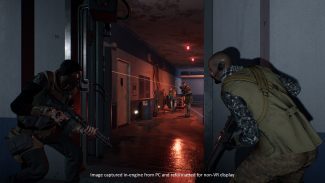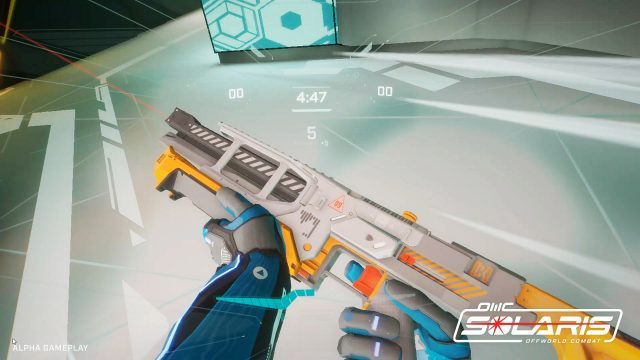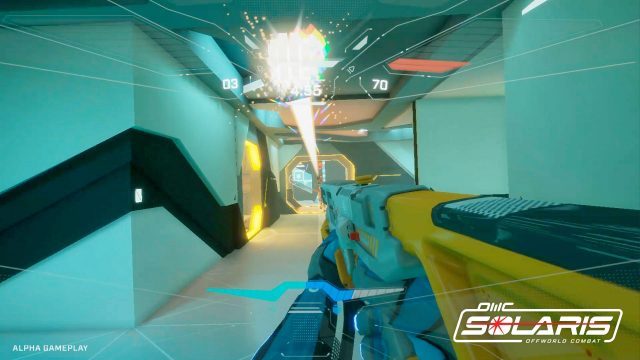
Launching today, Solaris Offworld Combat is a team-based VR arena shooter from First Contact Entertainment, the studio behind the lauded Firewall: Zero Hour (2018). This time around, the studio wants to deliver a fast-paced experience that anyone can pick up and play. My preview of the game reveals strong technical merit, but a potential clash between casual and competitive ambitions.
Thematically, Solaris Offworld Combat presents itself to players as a sort of future sport where competitors jump into virtual arenas and duke it out for the top place on the leaderboards. And that’s exactly what the game hopes to accomplish: foster a level of hardcore competition which keeps players and teams coming back for more.
And while developer First Contact Entertainment attracted a hardcore player base to its prior title, Firewall: Zero Hour, in many ways Solaris is doing the opposite of what resonated with that community.

Firewall: Zero Hour is a team-based PSVR mil-sim shooter with a slow, tactical pace. And that comes with the sort of mechanics you’d expect: loadouts, attachments, perks, reloads, ADS aiming, recoil control, etc. The sort of mechanics which give room for a deeper level of gameplay and strategy that goes beyond the act of putting your reticle on another player and pulling the trigger.
Solaris, on the other hand, is designed first and foremost for ease of play and a run-and-gun pace. The studio says its goal is to get anyone and everyone quickly into the action and deliver a “point and shoot” experience. And that’s apparently meant removing pretty much all of Firewall’s deeper gameplay elements; Solaris has no reloading, loadouts, attachments, or recoil control, and weapons project their reticle into the world so that there’s no need to aim down sights.
Rather than the slower, more tactical pace of Firewall—which gives an advantage to players who get themselves into the right position ahead of time—Solaris seems to expect players to be constantly moving, mostly using the thumbstick to strafe and juke rather than expecting much bodily movement from players like physically crouching or peeking around corners.
This breed of quick run-and-gun gameplay is par for the course in non-VR arena shooters, and on the surface Solaris has done a commendable job of translating the main tropes into VR. Player movement is quite fast compared to most VR games, even allowing players to slide for a few feet to try to stay behind cover while moving quickly. Everyone starts with the same basic pistol with unlimited ammo and can pick up weapons by walking over pads on the ground. Weapons have limited ammo and disappear once empty. Respawns are fast and time to kill is low. Shooting is of the point-and-shoot variety with no bullet travel or drop. It’s all undeniably functional.
After playing a few matches, it felt like I was playing a very cool version of VR laser tag. But it’s not clear to me yet whether the game has the level of depth needed to foster the competitive allure that First Contact hopes will keep the game buzzing with a stable player base. After all, laser tag is fun, but it’s not something most people are going to do on a weekly basis.
That’s not to say that Solaris doesn’t have—or won’t eventually be updated with—what it takes to bring out that high-level play, but there’s a lot left to prove. The most successful multiplayer VR shooter games so far have all been of the mil-sim variety, and have leaned into nuanced weapon interactions and a slower pace which are a natural fit for VR.
First Contact has taken the goal of ease-of-use so far that it has opted to make Solaris entirely free of two-handed interactions. In fact I was surprised to find that my off-hand in the game isn’t even tracked. Even as I move my hand around, my virtual hand wouldn’t respond to the motion at all, leaving me with the very awkward sensation that one of my arms was an extra appendage that I had no control over.

The studio said this was done for performance reasons and wanting to avoid the complexity of two-handed interactions. That’s well and good, but it’s a bit odd then that all of the weapons are—by their 3D models at least—designed to be held with two hands. It’s even more odd when my fake arm automatically grabs the gun’s grip all on its own.
Anyone that’s read my perspective on VR knows that I’m all-for ease-of-use in VR; overly complex interactions can often be more frustrating than they are fun. Half-Life: Alyx simplified its weapons by making them single-handed only, but it at least made use of the player’s off hand for reloading and other interactions like throwing grenades or opening doors. But it’s possible to get too simple as well.
If anyone can figure out how to make it work, First Contact Entertainment is a good bet. The studio cut their teeth on Firewall: Zero Hour, a game which after two years appears to still be going strong on PSVR. The studio says it’s continuing to deliver content updates to the game and has seen individual players top 1,000 hours in the game. The title is still lauded as one of the best shooters and best multiplayer games on the system.
That experience shines through clearly in the Solaris presentation; built on Unreal Engine 4, even on Quest the game is impressively sharp and runs very smoothly, with matches underpinned with dedicated servers.
And it’s the Quest audience—a younger demographic that your average enthusiast PC VR user—that Solaris is likely targeted toward. The game’s ease of entry and rapid-fire pace might be just the right combination for that group.
– – — – –
Solaris launches today on Oculus Rift and Oculus Quest with support for cross-buy and cross-play (it will launch on Steam and PSVR at some later date). First Contact is calling the launch a “pre-season,” and expects to listen carefully to player feedback. There’s one caveat with the pre-season which is odd for a team-based shooter—the pre-season will not allow players to form teams with their friends. All matches will be comprised of random teams, with the ability to invite friends being added at a later date.
The post ‘Solaris Offworld Combat’ Impressions – Virtual Laser Tag with Competitive Ambitions appeared first on Road to VR.
from Road to VR https://ift.tt/2FOZDaG
via IFTTT

No comments:
Post a Comment